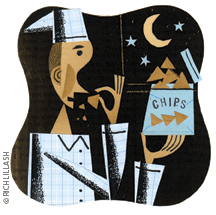Help for Midnight Snackers

You wake up in the middle of the night. Unable to fall back to sleep, you head to the kitchen, where you finish off that bag of tortilla chips that you began during the 11 o’clock news. Then you shuffle back to bed. At breakfast you can’t eat a single cornflake. But as the day goes on, you feel increasingly glum, and by nighttime, you’re snacking again.
Should you be one of the millions who suffer from Night Eating Syndrome—consuming more than half your calories after 8 p.m.—a promising treatment has been found by a Penn research team that includes Dr. Albert Stunkard, the Penn emeritus professor of psychiatry who first identified the disorder half a century ago.
The Penn study, directed by clinical psychiatrist Kelly Allison, found that two-thirds of NES patients who took the anti-depressant Zoloft achieved full remission of the disorder.
The results appear in greater detail in a recent book by Allison, Stunkard, and Sara Thier, Overcoming Night Eating Syndrome: A Step-by-Step Guide to Breaking the Cycle (New Harbinger Publications).
—S.F.
Woodward & Limbaugh?
Members of the press and the general public don’t seem to be seeing eye-to-eye. In a recent survey conducted by the Annenberg Public Policy Center, 86 percent of journalists agreed that news organizations get the facts straight in their stories, while only 45 percent of the general public thought so.
The public also holds a different opinion of journalists’ ethical practices, with 74 percent rating them as “somewhat” or “very” good. Among journalists, 95 percent expressed that view.
In addition, the study found that 30 percent of Americans ascribe the title “journalist” to Bob Woodward, one of two Washington Post reporters credited with breaking the Watergate story. In comparison, 27 percent of those surveyed agreed that Rush Limbaugh, the conservative, often controversial, radio commentator, should be referred to as a journalist.
The center conducted its survey before former FBI assistant director Mark Felt revealed himself as Deep Throat, one of the key sources for the Watergate reporting, but that didn’t stop 93 percent of journalists from saying that they considered Woodward “very close” or “somewhat close” to their idea of a journalist. Only 3 percent of these newspeople described Limbaugh as such.
—Molly Petrilla C’06
Costly Bullets

Eliminating firearm deaths would raise American male life expectancy more than the elimination of all colon and prostate cancers. It also would reduce the life-insurance premiums Americans pay by billions of dollars a year. Those are two of the findings of a Wharton professor looking at the costs of gun violence.
According to Dr. Jean Lemaire, a professor of insurance and actuarial science whose findings are published in this month’s Journal of Risk and Insurance, firearm violence shortens the lifespan of the average American by 104 days (151 days for white males and 362 days for black males). In terms of insurance, the portion of costs associated with gun deaths is at least on a level with the medical costs of gun-related injuries—around $2 billion annually. “As policymakers seek to reduce racial disparities in life expectancy in the U.S. and raise U.S. life expectancy to the levels of peer nations,” Lemaire writes, “the potential impact of reducing the availability of firearms should be considered.”
—S.F.
Heart-Glucose Link
Patients with Type 1 diabetes face a greater risk of developing heart disease than the average person, but that risk can be cut in half with long-term intensive treatment, according to a study led by Dr. Stanley Schwartz, director of diabetes disease management for Penn’s Health System.
Examining more than 1,300 patients, the study compared the outcomes of conventional insulin treatment with a more aggressive approach over an average of 6.5 years. Patients who received the latter treatment—which included more shots of insulin per day along with more frequent doctor’s visits and dietary reminders—had 57 percent fewer heart attacks, strokes, and other serious cardiovascular events than did the conventionally treated group.
—S.F.

